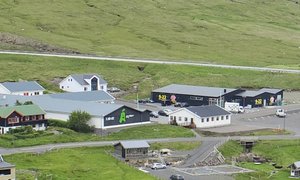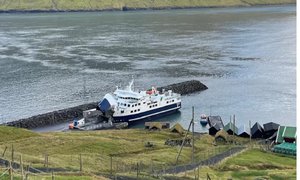FøroyaTele, the largest telecom company in the Faroes, is about to sign a contract with one of the world’s largest oil companies British Petroleum or better known as BP. This is a five-year contract and could be close to 100 million kroner writes Sosialurin in its Monday edition.
The contract is to link two of the producing oilfields west of Shetland, Schiehallion and Clair into the SheFar-cable, which is currently being laid between Shetland and the Faroes. This contract could also become the door opener for Føroya Tele as a supplier of various telecommunications to a large oil company.
This is the largest single contract ever signed by Føroya Tele.
Sosialurin understands that negotiations regarding this very exciting cooperation between one of the world’s largest oil companies and the largest IT Company in the Faroes are in the final stages.
Considerable savings for BP
There will be considerable savings for BP as they modernise the communications between oilfields where BP is the operating company and the land-based head office. To date BP has been forced to send all data and send IT specialists to the production site to deal with the many issues. This situation requires both transport and accommodation onboard the production platforms involved. By linking these two production units with cables and tying into the SheFar-cable, which will run from Scotland to Shetland to the Faroes, BP will be able to send almost unlimited amounts of data ashore. BP will gain direct access to the Scottish mainland by the SheFar-cable.
It is understood BP will initially rent data capacity for a five-year period.
The linking of oil platforms west of Shetland ashore is not a new idea. The demand for a permanent link ashore has been around for many years and a dialogue has been on-going on how to link oil platforms to the mainland. Already when the FarIce-cable was laid, this issue was debated, and when the SheFar-cable became a reality a link between oil platforms and the mainland also became a natural part of the dialogue.
It is quite clear if we look ahead and at the development of an oil production west of Shetland in general, that it may become a reality to link future oil producing fields by the Faroe border to this cable or more appropriately to the other producing oilfields already connected to the SheFar-cable.
There is, and there will be an ever increasing requirement from the oil companies for telecommunications, which is not being met today. For Faroe telecommunication companies an oil industry west of Shetland and close to the Faroe border could be worth its weight in gold.
Change routines
So then, what can oil companies save by cooperating with a Faroe telecommunications company?
According to sources Sosialurin has spoken to the expenditure saved by BP could be substantial as data can be sent directly ashore instead of transporting experts onboard platforms and the considerable effort involved saved. The question quite simply is also of installing modern telecommunications onboard the oil platforms and the FPSO vessels. This solution demands a cable and IT capacity. An oil company does not normally have telecommunications as its core interest area, and therefore it is sensible to cooperate with a telecommunications company capable of delivering such a service. This is where Føroya Tele comes into the picture, as it is capable of delivering both cables and the services required. It could be asked if not this was a task for British Telecom for example, and an answer could be that this may be regarded as too small a task for the larger telecom companies. On the other hand a certain size of telecom company is required, which the oil companies can fully rely upon as a partner. Føroya Telecom seems to have such a required size as a deal is on the doorstep.
SheFar-cable in the Faroes in September
The question is also what other services could come in the wake of this cooperation. For example, broadband and other wireless services. A futuristic question is how a company like Føroya Tele could handle all telecommunications services onboard an oil platform.
It is understood that the SheFar-cable will come ashore in the Faroes in September and the cables to Scheihallion and Clair are in the process of being laid. Sosialurin has tried to get a comment from the Føroya Tele CEO, Mr Kristian Davidsen, but he does not at the moment wish to make any comments, but he will confirm that negotiations have been with BP regarding cooperation.
The whole issue has been raised in public before however. At a meeting at the Oil Thinge recently, it was mentioned that Føroya Tele is working on intentions of establishing a close cooperation with a giant oil company and in the event these intentions came to fruition Føroya Telecom saw large future opportunities in becoming a supplier to BP in several of the areas the Faroe company is already engaged in. Recently the Shetland News wrote that the SheFar-cable could possibly form the basis for cooperation between Føroya Tele and BP. The paper wrote that in connection with the 800 kilometre cable project between Scotland and the Faroes, Føroya Tele intended to link the Scheihallion- and Clair oilfields with the SheFar-cable.
Sosialurin understands this large project is most welcome for Føroya Tele, who single-handedly has invested the 130 million required for the SheFar project, as the project immediately becomes more feasible financially.
Door opener
As mentioned previously, this project could become a door opener for Føroya Tele regarding many other services, both here and not least abroad. It is no big secret however, that both patience and professionalism is required if a contract is to be established with a large oil company. The beau racy is immense and it is all important to get a foothold and there are several indicators, which suggest that Føroya Tele is doing just that. The amounts involved could be very large and these would in turn reflect in the export statistics as figures, which have got absolutely nothing to do with our mainstay industry – the fishing industry.














